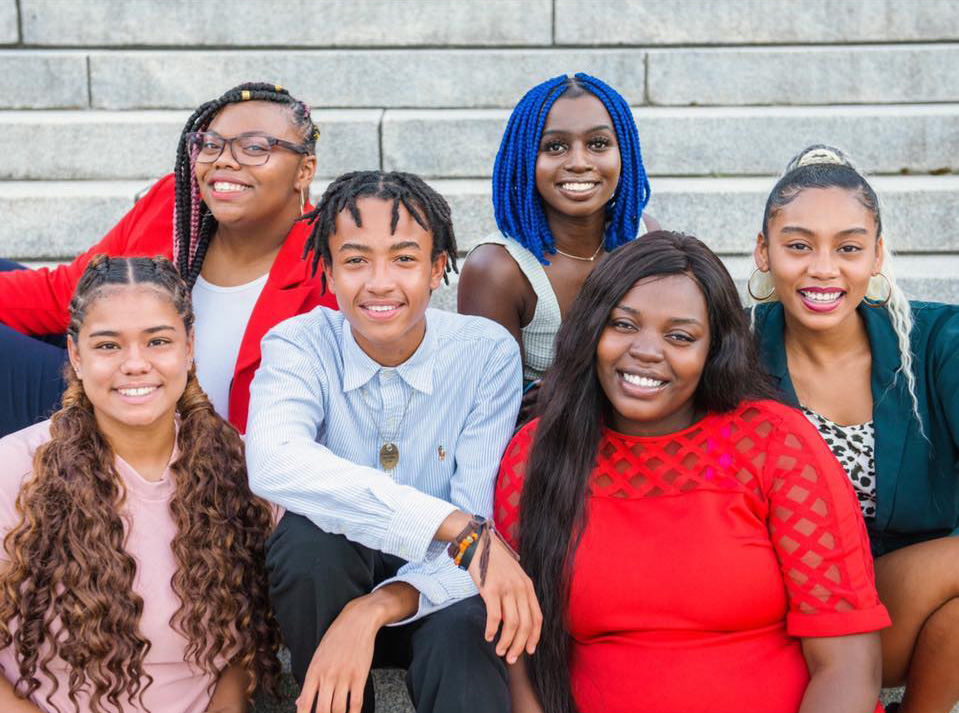As a first-generation college student, Paska Juma, ’19, navigated a zigzag path at the University of Nebraska–Lincoln. By utilizing Nebraska’s resources and finding her way into entrepreneurship after a few academic program changes, she built a toolbox of skills she uses today as a program manager at Google, social entrepreneur and activist.
“From my experiences in my entrepreneurship minor, what I use the most is my ability to network. It’s so valuable as a program manager, as you’re basically leading without influence. You have to make impact on the team without being their direct manager,” she said.
 Paska Juma graduated in 2019 from Nebraska. She earned a bachelor's degree in African and African American studies and minored in entrepreneurship. Photo courtesy of University Communication.
Paska Juma graduated in 2019 from Nebraska. She earned a bachelor's degree in African and African American studies and minored in entrepreneurship. Photo courtesy of University Communication.
Influencing Through Entrepreneurship
Juma gets the most out of her team at Google Fi, a telecommunications service by Google, by leaning into her strengths to empower others and strategize logistics. She credits her experience with Nebraska’s Center for Entrepreneurship for her growth into a leader.
“The entire entrepreneurship department at Nebraska cares about you more than you care about yourself. Dr. Sam Nelson got me my first internship, which was with Invest Nebraska. That internship led me to an opportunity at Spreetail, which ultimately helped me get to Google,” Juma said. “I competed in the center's competitions, and these experiences prepared me to pitch myself. It taught me how to rally a team together and how to influence without having power.”
She enrolled in many classes taught by Nelson. She frequented the center and appreciated how welcomed Brent Martin, coordinator, made her feel. She got involved in a student organization focused on entrepreneurship and dove deep into the center’s competitions.
“Paska won her room at our 3-2-1 Quick Pitch Competition,” said Nelson, director of the Center for Entrepreneurship and associate professor of practice in management. “She had a big vision for an online marketplace that specializes in hair, beauty and skincare for Black women. All she needed was help with the nuts and bolts, and we conquered that together in our business plan class.”
As Juma prepared to launch her “side hustle” company, Jamila Beauty, the COVID-19 pandemic hit. Wreaking havoc on supply chains across the world, the pandemic shut down the factory she trusted to produce her products. After working diligently on the startup since she graduated from college, the Lincoln, Nebraska native needed to pivot.
“Supply chain issues affected us all – in my business and at work with Google Fi. I decided to commit a year of fully being dedicated to the Black Leaders Movement,” Juma said.
Advocating for Social Justice
Established in June 2020, Lincoln’s Black Leaders Movement promotes the development of young Black leaders in order to achieve equality and justice for the Black community. Through education and activism, these high school and college students bring awareness to social justice issues, fight discrimination and hope to dismantle systemic racism.
“After the death of George Floyd, I saw that the protests weren’t organized. I met this group of high schoolers at the first protest who had a lot of passion. We needed to come together and meet regularly to organize our efforts. It was social entrepreneurship, just bringing together everyone’s great strengths. Each person shared their power in fundraising, organizing, public policy and more,” she said.
That summer, she worked on making this group of young adults into a 501(c)3 nonprofit called the Black Leaders Movement. She called on her network, including Bryan Seck, director of workforce development for the Lincoln Partnership for Economic Development, to help guide her through the process of becoming a nonprofit. They gained momentum by calling for social justice and commitment from the city’s leaders to address specific concerns rooted in inequality. Their organizing led to what Juma called “a pivotal moment” – bringing the peaceful protests to South Lincoln.
 Paska Juma (first row, right) and the other six co-founders of the Black Leaders Movement won the Young Citizens of the Year award from the Lincoln Young Professionals Group. Photo courtesy of Emily Hardy Photography.
Paska Juma (first row, right) and the other six co-founders of the Black Leaders Movement won the Young Citizens of the Year award from the Lincoln Young Professionals Group. Photo courtesy of Emily Hardy Photography.
“We didn’t know if anyone would show up,” Juma said. “Then we had around 300 people, which was one of our best protests. I remember thinking, ‘Now we have the attention of the city.’ It led to the opportunity to meet with Lincoln Mayor Leirion Gaylor Baird to discuss upcoming budget allocations.”
While the group did not achieve all they wanted this summer, their talks with Mayor Gaylor Baird led to including more voices in the search for the city's new police chief. Additionally, the Lincoln Police Department announced a “Hold Cops Accountable” initiative with Black community leaders at the Clyde Malone Community Center.
Juma shared how the Black Leaders Movement plans to expand their impact with a leadership conference, a scholarship program and an education program focusing on ending the school-to-prison pipeline. They also plan to start an annual market featuring Black-owned businesses in Nebraska.
“We’re working to create cohorts of individuals who dedicate 12 months to building whatever their specified racial justice goal is for that year. Just like in business, you have to set the foundation, build the network, and actually set out the vision to make sure it’s long-standing thing and continues after me,” she said.
For Nelson, this type of capacity building is another facet of entrepreneurship. To him, Juma excels in social entrepreneurship, the process of recognizing and resourcefully pursuing opportunities to create social value.
“The author David Bornstein said that ‘what business entrepreneurs are to the economy, social entrepreneurs are to social change,’” Nelson said. “Paska is helping Lincoln and its citizens become more civically engaged. The more folks we bring to the table, the different perspectives we have at our table will improve our ability to solve problems.”
For their work, the founders of the Black Leaders Movement – Juma, LeeAaron Berks, Pam Laam, Dominique Liu-Sang, Dario Rossin, KaDeja Sangoyele and Bryanna Schade – won the Young Citizens of the Year award from the Lincoln Young Professionals Group. City Councilman James Michael Bowers and Chamber of Commerce President Wendy Birdsall presented them with the award in November for their “outstanding contributions to the community.”
Creating a Path Forward
As her year dedicated to the Black Leaders Movement comes closer to an end, Juma sets her sights on using entrepreneurship once again to help people. This time, it is for her family.
“Entrepreneurship is the way out of multigenerational poverty. I want that for my family, especially my seven brothers. So, either I’m starting a business where I get to the point where I can employ them or I’m teaching them how to start their own business,” she said.
For now, she started yet another side hustle as a public speaker. She plans to speak on diversity enhancement, especially in human resources and recruitment, as well as resiliency by sharing her own story.
“Life has thrown a lot at me – coming from a low socioeconomic status, escaping poverty and living in a home with domestic violence. I want to help people find their tenacity and will to persevere over their life’s challenges,” she said. “I want to bring inspiration to others and let them know it’s not just a straight path and not everyone is going to be perfect. We all just need to hear that.”
To learn more about the Center for Entrepreneurship and its upcoming New Venture Competition, visit: https://business.unl.edu/entrepreneurship.
Published: March 11, 2021